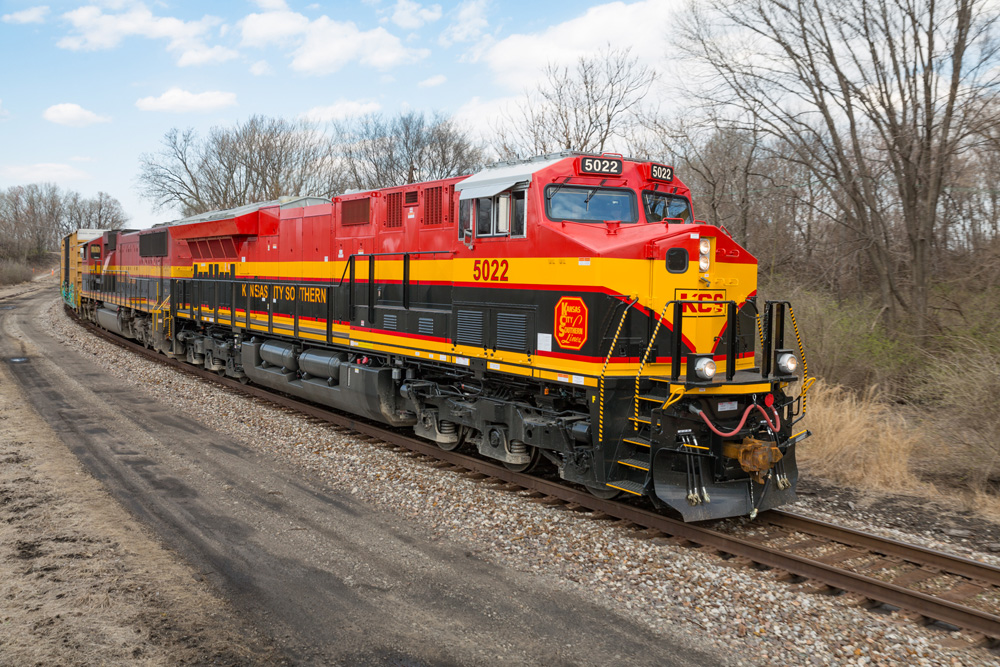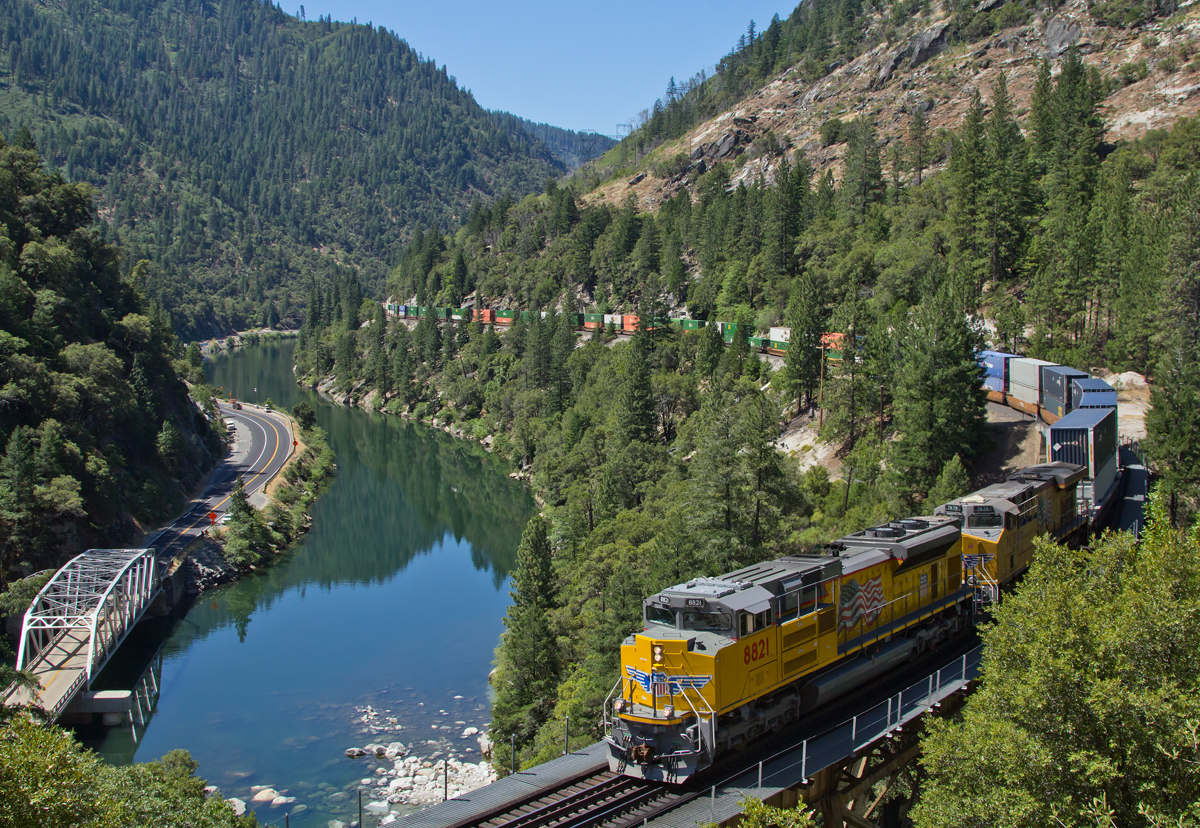
MONTREAL — Canadian National is fighting back.
In the wake of an activist investor’s call for a management shakeup and improved financial results, CN today announced a “Full Speed Ahead” plan to reduce its operating ratio, cut capital spending, and increase shareholder returns through a combination of earnings growth and share buybacks.
CN is targeting a 57% operating ratio for 2022, down from 65.4% last year and 62.5% through the first half of 2021. CN said a 57% operating ratio “is optimal for a world in which customers and regulators are putting a greater emphasis than ever on expanding customer choice, service and reliability.”
Capital spending will be held at the equivalent of 17% of revenue, or $3 billion, down from 25% of revenue in 2019. The railway will resume share repurchases, which were paused during the pandemic and its failed pursuit of Kansas City Southern, and aims to complete the $1.1 billion plan by the end of January.
 CN said it will generate $700 million in new operating income next year through improved operations, volume growth, a review of its non-rail businesses, and cutting management jobs. CN’s non-rail businesses, which add about 2 points to its operating ratio, include trucking line TransX, its Great Lakes shipping fleet, and a freight forwarding firm, CN World Wide. CN will seek to improve their operations or, failing that, sell them.
CN said it will generate $700 million in new operating income next year through improved operations, volume growth, a review of its non-rail businesses, and cutting management jobs. CN’s non-rail businesses, which add about 2 points to its operating ratio, include trucking line TransX, its Great Lakes shipping fleet, and a freight forwarding firm, CN World Wide. CN will seek to improve their operations or, failing that, sell them.
The end result: Boosting earnings per share by 20% next year.
The Full Speed Ahead plan is CN’s response to its second-largest investor’s call for improved financial performance and the replacement of CEO JJ Ruest, Chairman Robert Pace, and four CN board members.
The TCI Fund, the London-based firm that holds $4 billion worth of CN shares, ripped CN’s management in a presentation posted to its website and in a scathing letter to the railway’s board earlier this month.
Hours after it was unveiled, CN’s Full Speed Ahead plan hit a speed bump: TCI doesn’t like it. “TCI is not impressed with Canadian National’s sudden strategic plan,” the fund said in a statement. “Why wasn’t this done before? The current management lacks the credibility to execute the plan.”
In May TCI urged CN to drop its KCS bid, citing the regulatory risk. While CN lost the KCS battle to rival Canadian Pacific, it did net $700 million in breakup fees, which independent analyst Anthony B. Hatch says may partially blunt TCI’s argument for management change.
“Since 2016, CN’s financial results have lagged significantly behind those of the other railroads,” TCI Managing Director Chris Hohn and Partner Ben Walker wrote. “The company has underperformed on nearly every measure of productivity and efficiency. Revenues per [revenue ton-mile], expenses per RTM, return on capital, operating ratio and profits have all gone backwards compared to the rest of the industry. CN has lost its way and the business needs to be fixed as a matter of urgency.”
The answer to the problem, TCI says, is bringing in CN veteran Jim Vena as chief executive. TCI also wants to add rail experience to the CN board and seeks to replace four directors with Gil Lamphere, a former board member at Illinois Central, CN, and CSX Transportation; former Union Pacific Chief Financial Officer Rob Knight, former CN executive Paul Miller, and former Credit Suisse transportation analyst Allison Landry.
The board has backed CEO JJ Ruest and his management team. “I am confident that CN’s senior management, a team of world-class railroaders who are focused on redefining the rail industry, have the skills and determination to lead the company into this exciting next phase,” Pace said in a statement today.
TCI has called for a special meeting of CN shareholders to consider its proposals. The firm says it has the backing of other CN shareholders.
CN has three weeks from receipt of TCI’s request to respond, but Canadian law does not specify a time frame for when the special shareholder meeting must be held.














With our crap economy like we have endured, from the previous two years. I am not surprised at all that this is happening.
I am also a small stockholder in CN. I don’t feel it is not wise to cut spending on capital expense and operations since this will hurt our returns long term. Buy backs are not some magic way to improve the company. They usually only add to higher debt or reduced investment in the company. As to selling off assets like the trucking or Great Lakes shipping let management do a close study to see if they fit in to provide added value to providing business to the railroad. I also own stock in GATX who is a leading railroad leasing company. That recently sold off their Great Lakers shipping decision but I did not see much difference in helping or hurting the company. So beware if the management makes the wrong decisions on long term investment in the company. Remember rail is a capital intensive industry not some consumer or high tech operation that can operate with less capital investment.
All of the above good news for the future of CPKC!
Oh well, in the Montreal area, this past weekend, there were dozens of assignments delayed or cancelled because they couldn’t find employees and spare lists were empty. Yards are overflowing, and customers are not being served. But layoffs are required, apparently. Way to go CN.
PSR is hasting the demise of railroading. It’s a scheme to ride into oblivion, fast.
As a small shareholder I was pleased at the way current management built back customer service and invested in infrastructure after the ravages of EHH. But I considered it ill advised to try to buy KCS. But I don’t want TCI to take over the railroad and double down on PSR. Nevertheless, I’m disappointed that current management wants to out-do TCI in cutting capital investment in order to bribe shareholders into voting against TCI. I want another alternative to vote my inconsequential number of shares. How about bring Matt Rose out of retirement to run CN?
Hubris and Ego on the part of Ruest. That’s what took him to this point in time. Blinded to reality by the light….
For a good read on Hubris and Ego: https://www.barnesandnoble.com/w/the-men-who-loved-trains-rush-loving/1111326073
Slash and Burn your way to “Boosting earnings per share by 20% next year.”? Good Luck with that, that’s just the start of the downfall, all for “shareholder” quick profits instead of long term strategic planning. Cut your capital spending down from 25% to 17% this year? What then slash it another 8% next year to hold up the bottom line and the year after? “All for the Shareholders” I’ve heard many times at my places just to see them eventually fail and merge or close up shop. TCI is correct in calling for new members, if TCI is looking for long term profits.
Slash and Burn, the PSR motto.
Doesn’t sound good for Great Lakes Fleet. Doesn’t give me much hope for the fire damaged Roger Blough or the Cason J. Callaway that’s in need of a fair bit of work, or the presently idled Philip R. Clarke.
I’m surprised it’s lasted this long though. Everyone seemingly thought CNR would scuttle the fleet pretty quickly with it basically being forced upon them as part of a package deal. But here we are 15 or so years later and it’s still CNR owned.
Hi Charles, see a lot of them on the Dundas sub heading in and out of Toronto also
These are probably the same ones you see in Wisconsin
A bit off topic — Through Wisconsin I see many ZIM (Israel) containers on CNR, none on CPR. Do these go to the Port of New Orleans?
ZIM signed a long term port deal with the Port of Prince Rupert back in 2019. Who services Prince Rupert?
Cowards! CN is basically doing the same things any hidebound American business would do in the process of destroying itself, all in the name of “shareholders” Mr. Reust, your income comes from servicing **customers**, not some group of coke-snorting Wall St. yuppies. If the shareholders don’t like the way you run your business, let them sell their shares and buy shares of some other brain-dead lickspittle American business.
Actually… no. First of all it is Mr. Ruest, “JJ” to his buddies, not including myself. But _his_ compensation is determined by the Board, who represent _shareholders_ who are the _owners_ of CN. CN revenue comes (in part) from serving customers. Of course if the customers are dissatisfied they may be able to take their business elsewhere, or maybe not.
The “coke-snorting Wall St. yuppies” is a good one, although I’m not sure it applies to Mr. Hohn or TCI.
“Full Speed Ahead” – yikes. [:o|
All the hard work that Mongeau and Ruest have done to repair HHH’s damage are now down the drain. I totally agree with the thoughts above.
I have called out CN at times for their decisions, but TCI is pushing it a little too far. But call it what it is, CN is trying to buy off TCI by shifting capex to stock buybacks. This requires deferring needed capex spending on the physical plant.
TCI may represent “stakeholders” but they are not the only stakeholders in these decisions. Ok, so a minority of shareholders didn’t want CN to make a move on KCS, we get it, but don’t punish the rest because 20% got greedy and had a hissy fit.
Agree with others. Cutting capital spending and growth for the benefits of shareholders is not in the public interest. Shareholders are not the only stakeholders.
I think we are about to witness what greed of a few major investors is about to do to a railroad that has been relatively well ran and investing in the railroad infrastructure, and trying to grow by adding trucking instead of someone’s pocket.
Time for Canada to renationalize the CN.
CN is happy to spend $1.1 billion on buying shares – which boosts earnings per share but doesn’t improve the company in any way whatsoever.
Spending $1.1 billion on capital investments to make the company more profitable will ultimately benefit shareholders.
TCI is just interested in measures that juices the share price in the short run so it can sell at a profit, without caring about the long-term effects.
Know what would be the most ironic? If CN puts themselves onto such a thin margin that they eventually get into a bind and have to start selling stuff. Like, maybe, the former Illinois Central… just to generate capitol… because by then the railroad would be falling apart!
I’m sorry to see this happen. Cutting capex, possibly shedding the trucking assets and cutting jobs is not the pathway to strategic growth. But, money changers like Chris Hohn don’t really give a crap about strategic growth and, under the present circumstances, I guess JJ and the board have little choice but to dance to Hohn’s music. One of Hohn’s complaints about CN leadership was their failure to recognize changes in the regulatory environment. Hohn appears to be oblivious himself to STB Chairman Oberman’s recent comments about railroads needing to focus on growth and less on responding to Wall Street dictates. What Hohn is forcing CN leadership to do here is counter to the direction the STB is heading.
The race to the bottom continue.